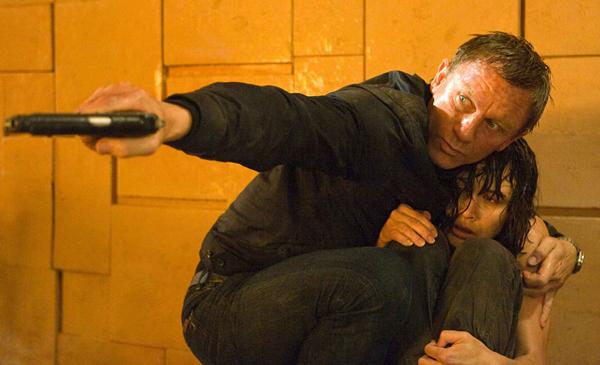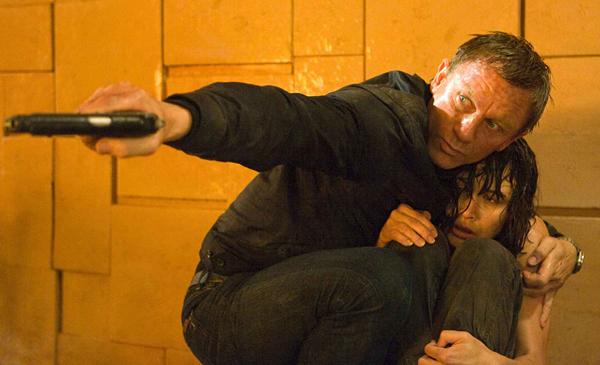
Casino Royale was a smart and effective reinvention of the Bond franchise, and so hopes were high that Quantum of Solace would take another step in the right direction. Sadly, Quantum is the idea of a great movie, not the execution of one. There’s something missing at its heart: we’re left waiting for catharsis or closure that never comes.
After slamming viewers into the story with several chase scenes (by car and on foot) that are both unnecessary and shakily presented (director Marc Forster excelled with the poignant Monster’s Ball, but seems less sure of himself in an action film), Bond comes into contact with Camille (the beautiful Olga Kurylenko), and the two team up to pursue the villains on the typical Bond movie jaunt around the world. Bond is multitasking: tracking down those in Quantum responsible for Vesper’s death while also keeping tabs on the villainous Mathieu Amalric (the unconvincing Dominic Greene).
Amalric wants to buy up desert land in Bolivia so he can overthrow the government and manufacture a drought so that he can become the country’s sole water supplier. Camille is out for revenge too: her family met their ends at the hands of a corrupt South American military dictator who is also in cahoots with Amalric. Understand? No? Too bad—it’s time for another chase scene, this time by plane!
The idea of two grieving people seeking revenge together is a nice thought begging to be better explored. The writers throw Camille a few lines of dialogue to explore this issue, something along the lines of, “I want to know what revenge feels like,” and later to Bond, “I wish I could free you from your prison.” But before we can get behind the attractive duo, something else has exploded and they’re walking through the desert. It’s a big miss that with two fine actors portraying two intriguing characters with compelling back stories, we don’t care about them as much as we could.
Yet somehow, the principal actors all acquit themselves. We know what Daniel Craig is capable of as James Bond from Casino Royale, and so we can give him a pass in Quantum. Casino Royale allowed Craig to show quite a bit of range—cunning spy, dangerously physical assassin, passionate lover, wayward agent, and grieving soul (to name a few). But in Quantum, Craig is required to play everything so close to the chest that it becomes difficult to identify with him.
We know logically that Bond is suffering and that his actions are motivated by loss, but the film gives him no opportunity to show his grief or to let his emotions go. He does gain some momentum in his scenes with Judi Dench’s M, who is as much of a boss as a parental figure.
But Dench somehow speaks more than Craig does. It’s a personality bypass, and it’s a testament to his acting that we still root for him. It’s also very indicative of the problems of Quantum: not enough heart, clarity, or insight, just a lot of unrealized potential.



















































